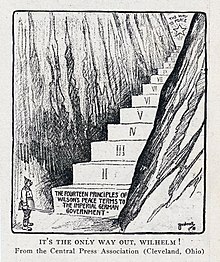Wilson opens his points by stressing that the entangling alliances got the world into this conflict, and that the US could not stay out due to threats to national security. His 14 points are:
- No secret alliances
- Freedom of the seas, naval freedom
- Free trade between countries and the minimization of economic barriers between nations
- Reduction of arms across the board
- Just resolution colonial issues
- Restoration of Russian lands effected
- Sovereignty of Belgium
- Alsace-Lorraine given back to France
- Italian borders determined through nationality
- Self Determination in former Austria-Hungarian territory
- Self-Determination in the Balkan region
- Self-Determination of territory on outskirts of turkey
- Independent Poland
- International peacekeeping institution (league of nations)
Wilson stresses the minimization of revenge upon germany to conclude his speech.

The UN was a byproduct of the league of nations' failure
Comments
Post a Comment